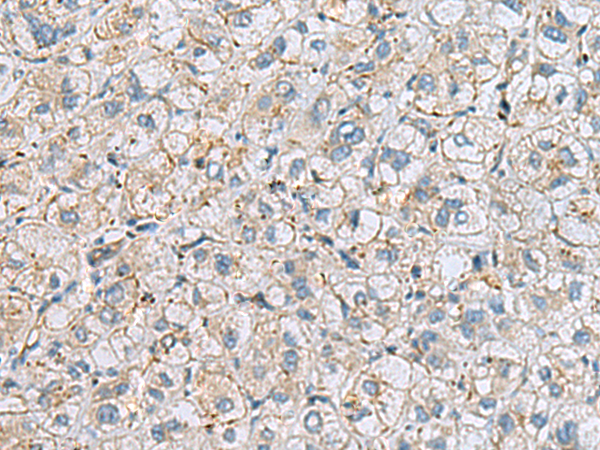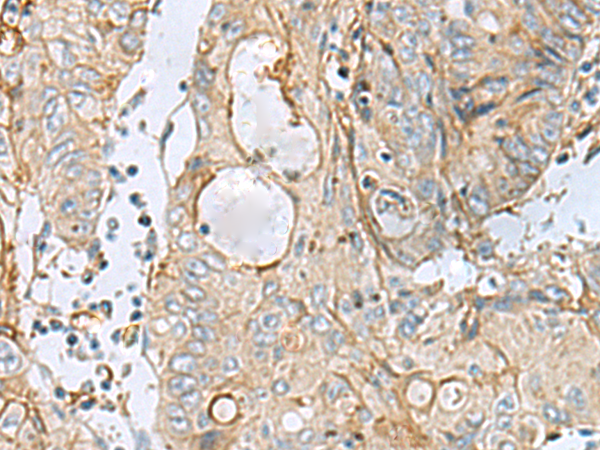

| WB | 咨询技术 | Human,Mouse,Rat |
| IF | 咨询技术 | Human,Mouse,Rat |
| IHC | 1/50-1/200 | Human,Mouse,Rat |
| ICC | 技术咨询 | Human,Mouse,Rat |
| FCM | 咨询技术 | Human,Mouse,Rat |
| Elisa | 1/5000-1/10000 | Human,Mouse,Rat |
| Aliases | NMDMC |
| Host/Isotype | Rabbit IgG |
| Antibody Type | Primary antibody |
| Storage | Store at 4°C short term. Aliquot and store at -20°C long term. Avoid freeze/thaw cycles. |
| Species Reactivity | Human, Mouse |
| Immunogen | Fusion protein of human MTHFD2 |
| Formulation | Purified antibody in PBS with 0.05% sodium azide and 50% glycerol. |
+ +
以下是3篇关于MTHFD2抗体的参考文献及其简要摘要:
1. **文献名称**: *Metformin as an Anticancer Agent: Actions and Mechanisms Targeting Cancer Stem Cells*
**作者**: Jain, M. et al.
**摘要**: 研究探讨了MTHFD2在癌症代谢重编程中的作用,使用特异性抗体验证其在多种癌细胞系中高表达,并揭示其通过调控一碳代谢促进肿瘤增殖的机制。
2. **文献名称**: *MTHFD2 is a metabolic checkpoint in hematopoietic stem cells and leukemia development*
**作者**: Gustafsson Sheppard, N. et al.
**摘要**: 通过MTHFD2抗体检测,发现其在急性髓系白血病(AML)中显著上调,抑制MTHFD2可破坏癌细胞的核苷酸合成,为靶向治疗提供依据。
3. **文献名称**: *Mitochondrial MTHFD2 regulates redox homeostasis in cancer cells*
**作者**: Nilsson, R. et al.
**摘要**: 利用MTHFD2抗体进行蛋白定位和表达分析,发现其通过调控线粒体氧化还原平衡影响癌细胞存活,敲低MTHFD2导致ROS积累和细胞死亡。
4. **文献名称**: *Antibody validation for mitochondrial enzymes: A case study of MTHFD2*
**作者**: Lehtinen, L. et al.
**摘要**: 研究系统验证了MTHFD2抗体的特异性,通过Western blot和免疫荧光确认其在多种组织中的表达模式,为后续功能研究提供可靠工具。
建议通过PubMed或Google Scholar核对具体文献细节。
The MTHFD2 (methylenetetrahydrofolate dehydrogenase 2) antibody is a critical tool for studying the mitochondrial folate-mediated one-carbon metabolism pathway. MTHFD2 is a bifunctional enzyme that catalyzes the NAD+-dependent dehydrogenation of methylenetetrahydrofolate (CH2-THF) to methenyl-THF and its subsequent cyclohydrolase activity to form formyl-THF. This enzyme plays a pivotal role in generating one-carbon units essential for purine and thymidylate synthesis, supporting rapid cell proliferation in cancers and developing tissues.
MTHFD2 is overexpressed in many cancers, including breast, lung, and colorectal malignancies, where its activity is linked to tumor growth, poor prognosis, and chemoresistance. Its selective expression in proliferating cells makes it a promising therapeutic target. Researchers use MTHFD2 antibodies primarily for detecting protein expression levels via Western blotting, immunohistochemistry (IHC), or immunofluorescence (IF). These applications help elucidate its subcellular localization (mitochondrial), tissue distribution, and correlation with disease progression.
Additionally, MTHFD2 antibodies are employed in functional studies to explore metabolic dependencies in cancer cells and evaluate inhibitors targeting this enzyme. Validating antibody specificity is crucial due to homology with its cytosolic counterpart, MTHFD1. Overall, MTHFD2 antibodies are vital for advancing research into cancer metabolism, biomarker discovery, and the development of targeted therapies.
×